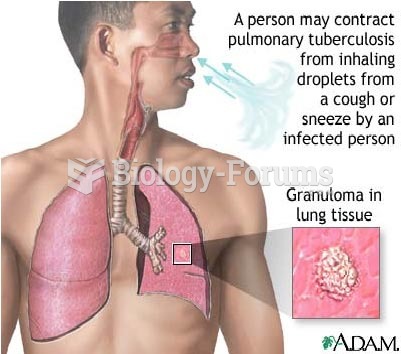|
|
|
Earwax has antimicrobial properties that reduce the viability of bacteria and fungus in the human ear.
Signs and symptoms that may signify an eye tumor include general blurred vision, bulging eye(s), double vision, a sensation of a foreign body in the eye(s), iris defects, limited ability to move the eyelid(s), limited ability to move the eye(s), pain or discomfort in or around the eyes or eyelids, red or pink eyes, white or cloud spots on the eye(s), colored spots on the eyelid(s), swelling around the eyes, swollen eyelid(s), and general vision loss.
Your heart beats over 36 million times a year.
Today, nearly 8 out of 10 pregnant women living with HIV (about 1.1 million), receive antiretrovirals.
About 100 new prescription or over-the-counter drugs come into the U.S. market every year.
 Epidemiologists look for the causes of disease, such as toxic waste and industrial pollution, at the
Epidemiologists look for the causes of disease, such as toxic waste and industrial pollution, at the
 Patients with celiac disease must maintain a gluten-free diet. Many gluten-free items are widely ...
Patients with celiac disease must maintain a gluten-free diet. Many gluten-free items are widely ...





